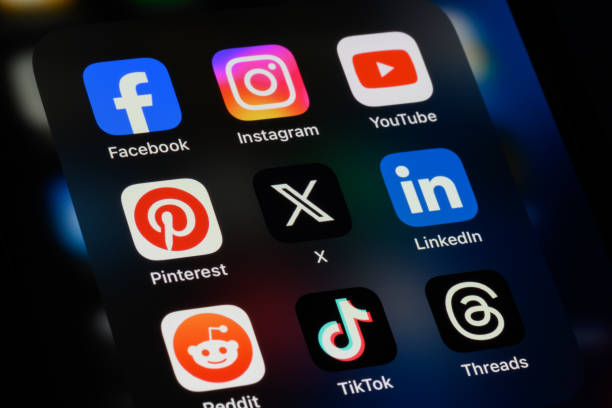The Technology Imperative in Mental Healthcare
Modern mental health clinics operate in a complex environment: clinical excellence, administrative efficiency, and data security all need to coexist. IT solutions have become the backbone of successful practices, enabling better care, streamlined workflows, and robust privacy protections.
From secure Electronic Health Records (EHR) to teletherapy platforms and client portals, integrating the right technologies can elevate both patient experience and clinic performance. In this article, we explore essential IT components—from practice management systems to analytics tools—and guide mental health clinics through implementation, compliance, and continuous improvement.
1. Electronic Health Record (EHR) Systems: The Clinic’s Central Nervous System
A reliable EHR system is critical for managing client data, treatment plans, billing, and documentation—all while maintaining HIPAA compliance.
Why EHR Matters:
- Centralized Records: All assessments, progress notes, and session details in one secure location
- Improved Workflow: Automated appointment reminders, billing, and claims
- Data-Driven Care: Monitor client progress via standardized assessments
- Compliance: Audit trails, consent tracking, and secure storage
When choosing an EHR, clinics must weigh four critical factors:
- HIPAA compliance
- Seamless integration with scheduling
- Customizable forms and note templates
- Teletherapy compatibility
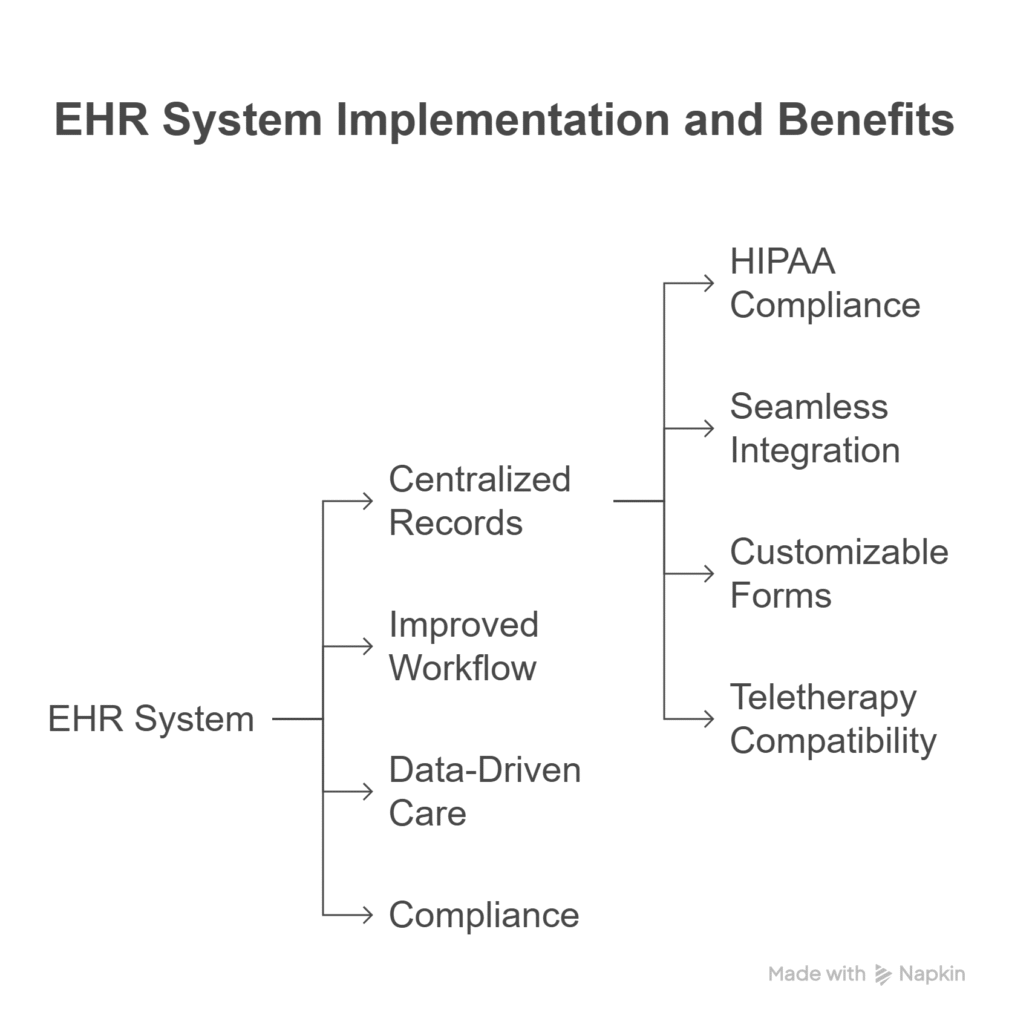
Explore more about practice-focused solutions in Choosing the Best EHR for Your Therapy Practice.
2. Teletherapy Platforms: Expanding Access with Integrity
Offering teletherapy is no longer optional—it’s expected. Clients value remote access, especially in underserved areas or during crises.
Key considerations:
- Secure Video Calls: End-to-end encryption and HIPAA compliance
- Scheduling Integration: Automated session creation from booking systems
- Automated Reminders: Reducing no-shows and ensuring clarity
- Document Sharing Tools: In-session worksheets and resources
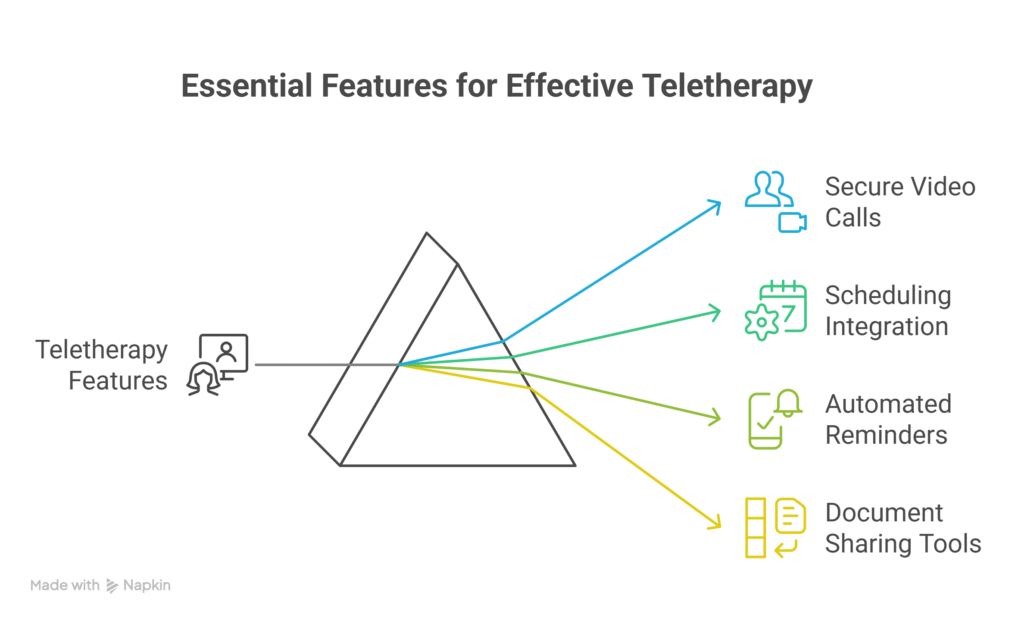
For clinics starting teletherapy, it’s essential to offer a platform that creates user confidence with security-first design. Details on must-have features can be found in Teletherapy Website Features Every Therapist Needs.
3. Client Portals & Mobile App Engagement
Portals and apps put tools, forms, and communication in clients’ hands—literally.
🔹 Key Features:
- Secure messaging for client–therapist communication
- Sharing assessments and homework between sessions
- In-app reminders and session recaps
- Options to update personal and insurance info
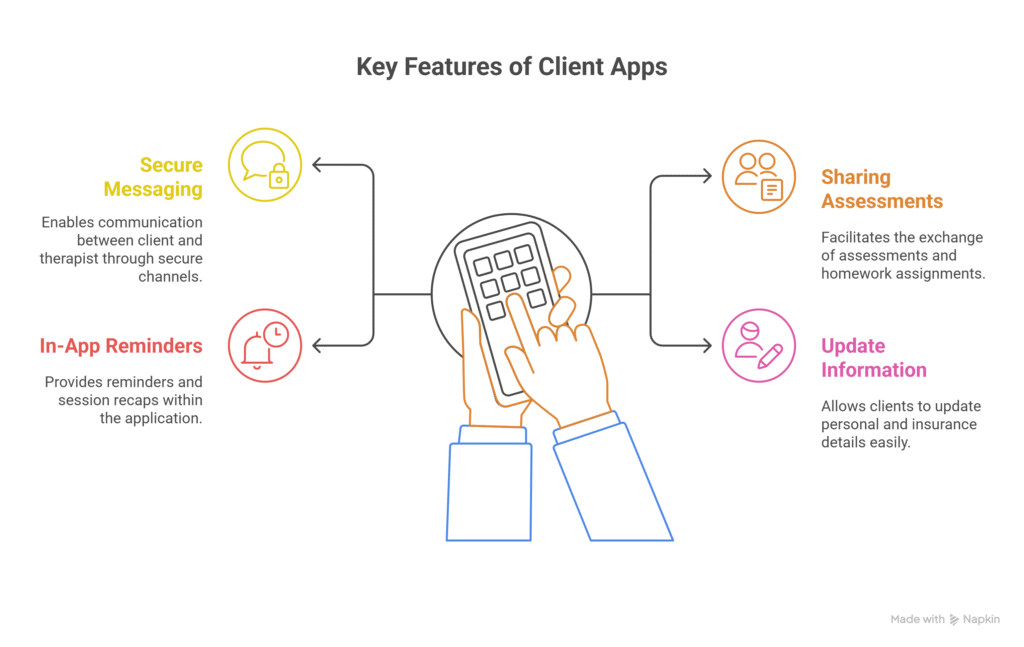
An intuitive client app improves engagement, reduces administrative barriers, and enhances continuity of care.
4. Appointment Scheduling & Payment Gateways
Online scheduling is a game-changer in client satisfaction and administrative efficiency.
Important components:
- Calendar sync across therapists and clinics
- Custom intake form workflows
- Deposit or pay-at-booking options
- Automated reminders via SMS/email
- Simple cancellation and rescheduling options
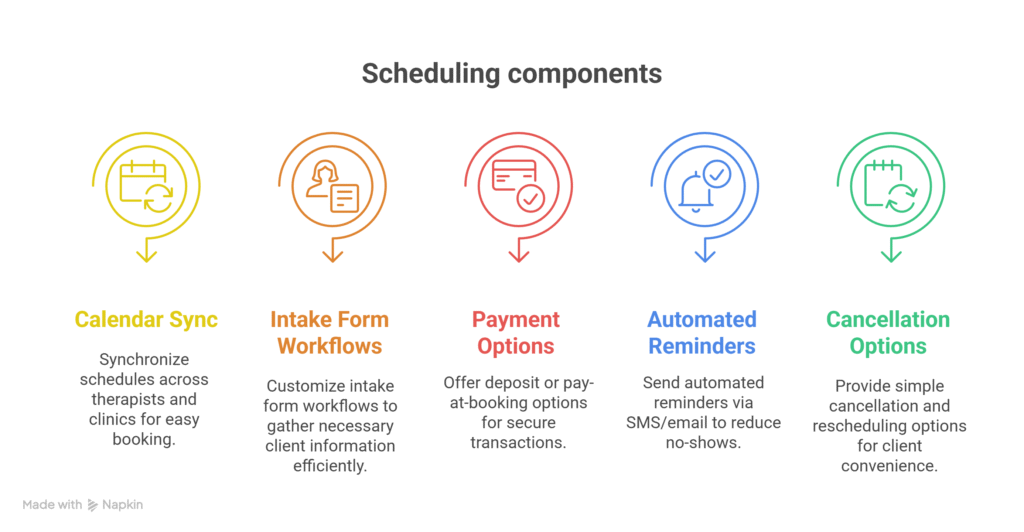
Tools like SimplePractice or TheraNest often integrate seamlessly with major EHR platforms—no need for manual duplication.
5. Digital Forms, Intake, and Workflow Automation
Digital forms streamline intake and consent, reducing friction for clients.
Automated features:
- Conditional intake flows with signature capture
- Consent reminders and pending form alerts
- Integration into client records
- Automated follow-up after missed forms or sessions
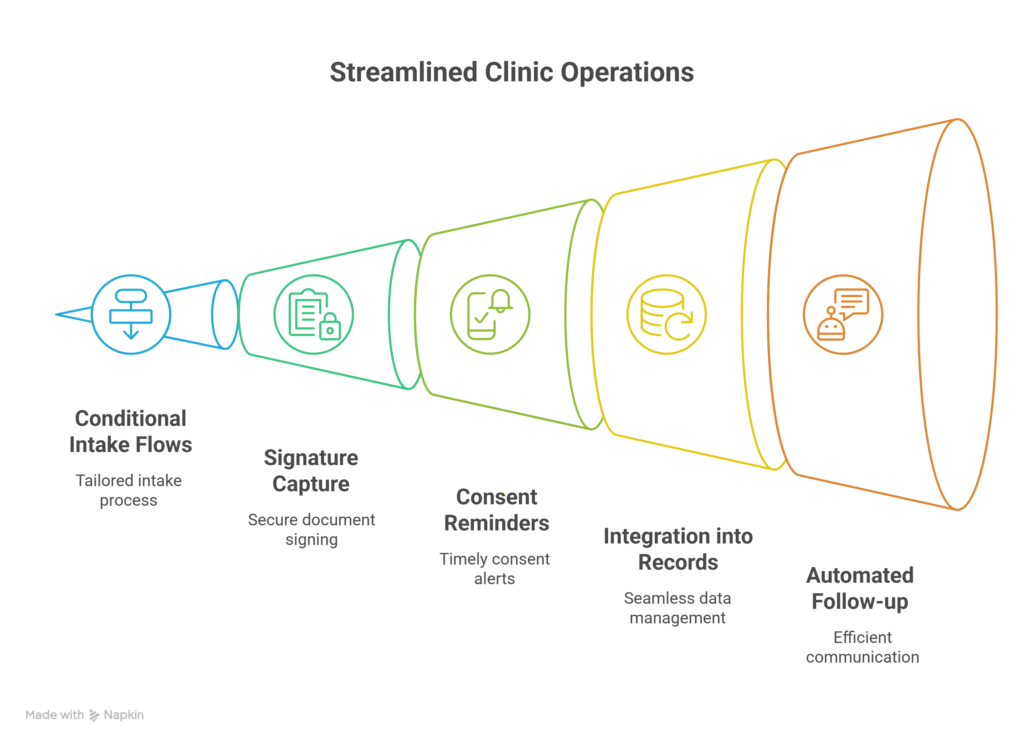
These systems keep clinics on track and compliant—with fewer administrative headaches.
6. Cybersecurity & Compliance
With sensitive mental health data at risk, security is non-negotiable.
Best practices:
- Encryption in transit and at rest (256-bit or AES)
- Dual-factor authentication for clinician access
- Audit logs for session and record access
- Regular backups and disaster recovery plans
- Routine compliance training and policy refreshes
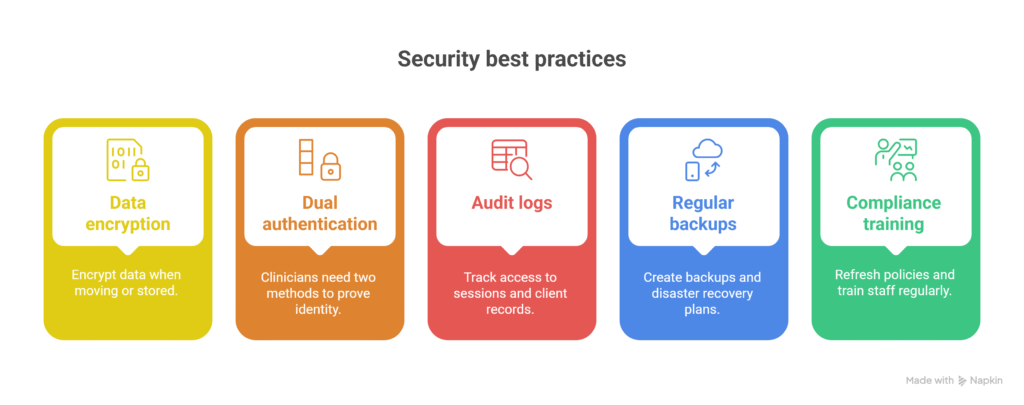
Securing client data builds trust and shields clinics from regulatory penalties.
7. Analytics & Outcome Tracking
Insightful analytics help clinics improve clinical outcomes and operational efficiency.
Recommended data tracking:
- Client progress metrics (PHQ‑9, GAD‑7, etc.)
- Appointment status trends (no-show, cancellation)
- Revenue trends per clinician or practice area
- Client satisfaction surveys
- Referral path effectiveness
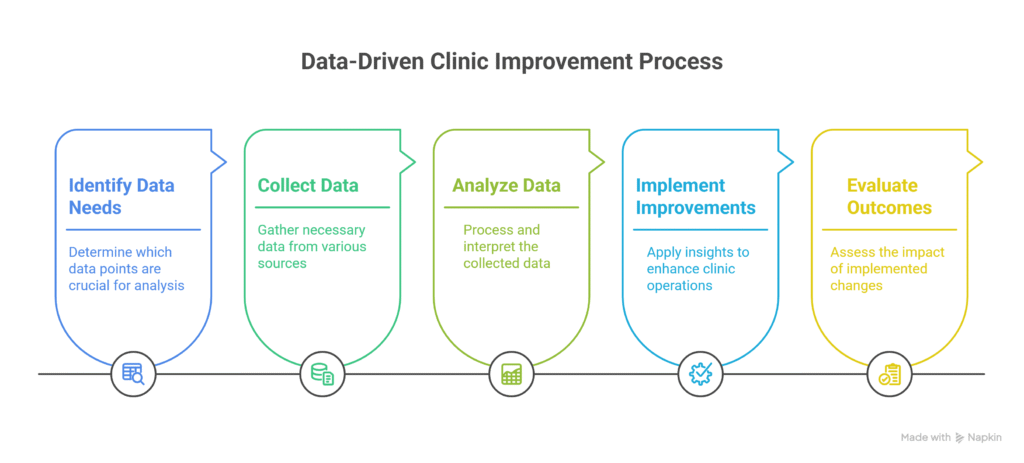
This data is the smart foundation for expanding services, optimizing staffing, or refining outreach.
8. Integrations & Interoperability
Your IT landscape should feel unified, not fragmented.
Ideal integrations include:
- EHR ↔ Scheduling ↔ Teletherapy platform
- CRM integration for intake and marketing
- Billing system synced with insurance verification
- Secure email and communication tools linked to session records
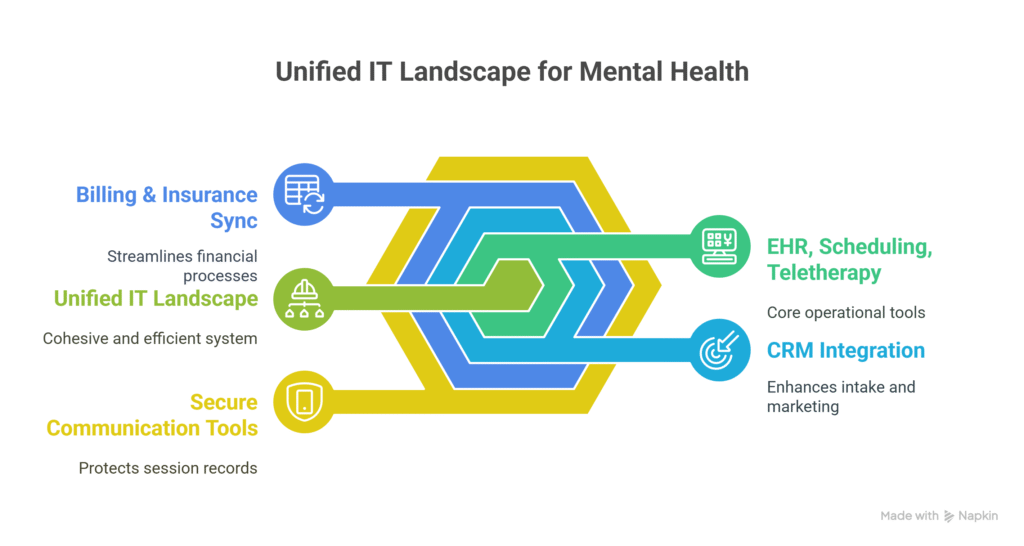
To learn more about cohesive systems, explore how EHRs can reduce admin workload in How EHRs Help Mental Health Professionals Reduce Administrative Burden.
9. Mobile-First & Accessibility Considerations
Clients use mobile devices more than desktops for appointment management and form completion.
Key areas of focus:
- Responsiveness across Android/iOS and browser
- Tap-friendly buttons and legible text sizes
- Alt-text for images and screen reader compatibility
- Compliance with WCAG 2.1 accessibility standards
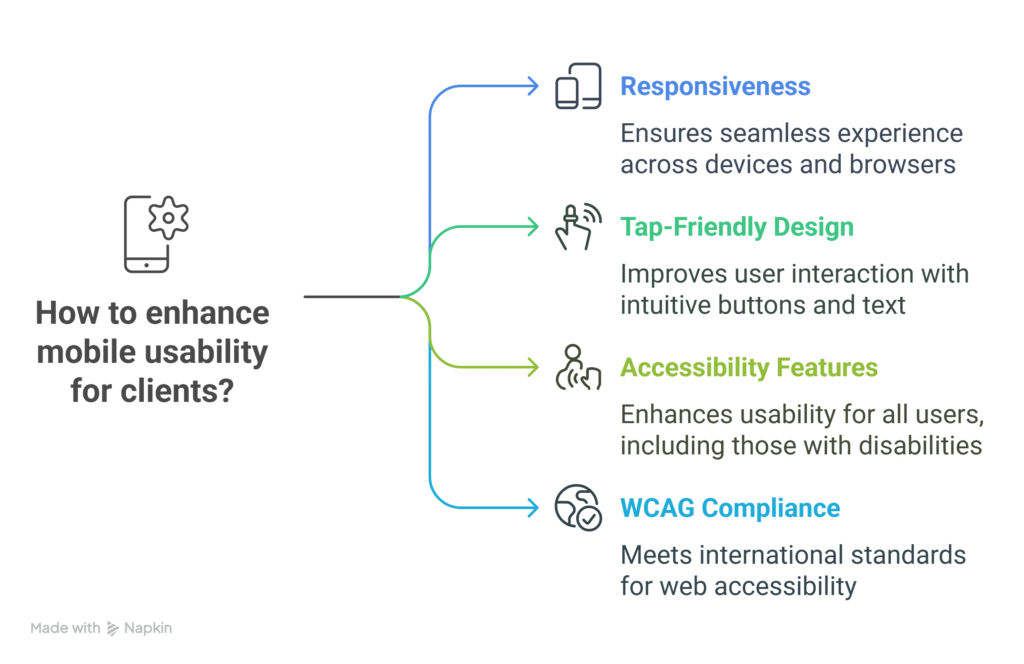
Mobile usability isn’t optional—it’s essential.
10. Staff Training & Onboarding Strategy
A technology rollout is only as good as its user adoption.
Best practices:
- Stepwise rollout for critical features
- Tailored training (webinars, guides, office visits)
- Dedicated IT contact or vendor access
- Support channels for troubleshooting
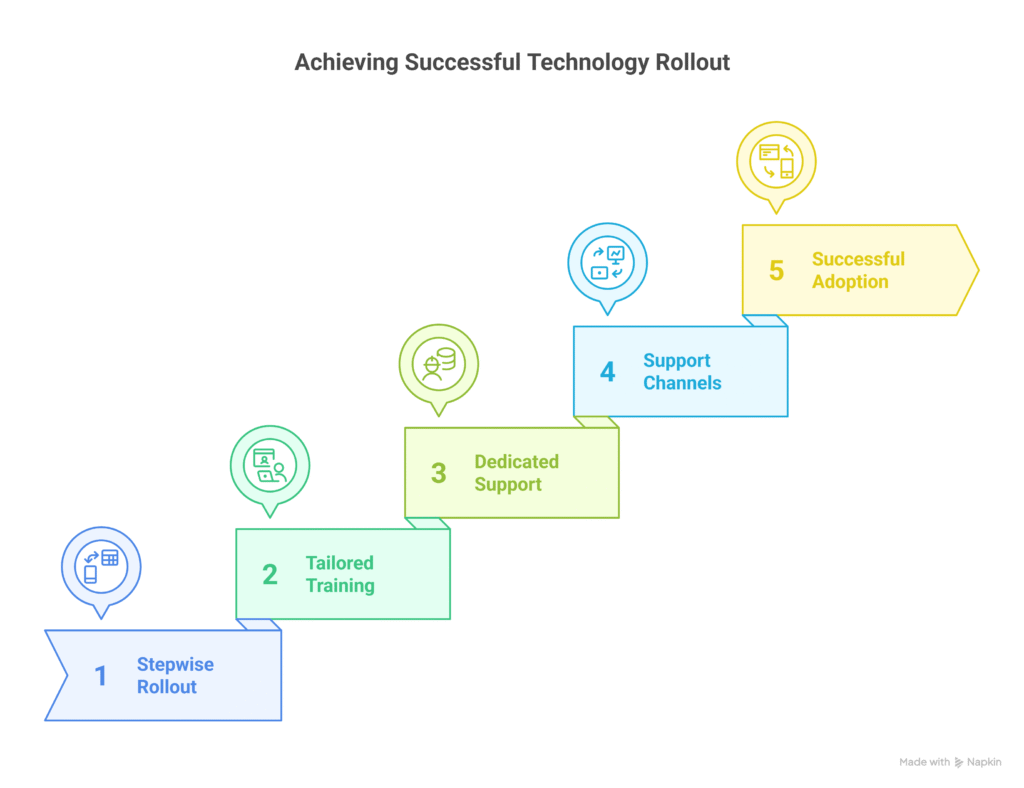
Proper training prevents errors, maintains security, and builds staff confidence.
11. Multidisciplinary Clinic Use Cases
From solo practices to large clinics, IT needs evolve.
Solo Practices benefit from:
- Tap-and-go systems
- Unified app+EHR+notes
- Affordable monthly subscriptions
Group Practices require:
- Multi-provider billing and scheduling
- Role-based access control
- Centralized admin dashboards
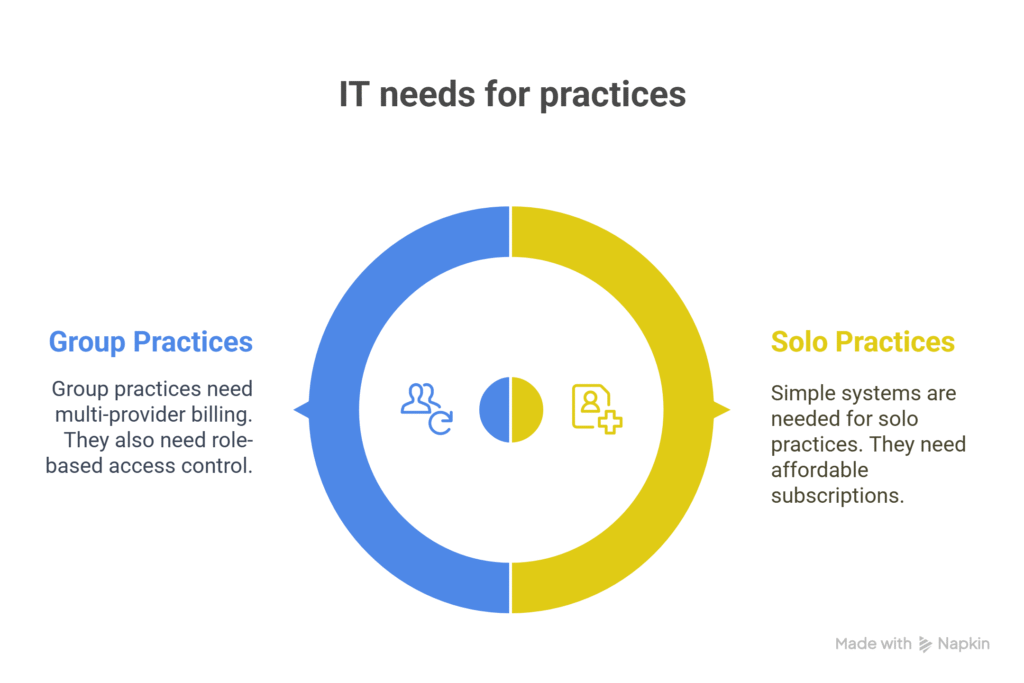
The right configuration accommodates scale and maintains care quality.
12. Future-Proofing Your Clinic with Emerging Technology
The healthcare tech landscape continues to evolve.
Emerging trends include:
- AI features for predictive appointment scheduling
- Biometric self-reporting via mobile sensors
- Interoperable standards between medical and mental health records
- Chatbots for educational and screening touchpoints
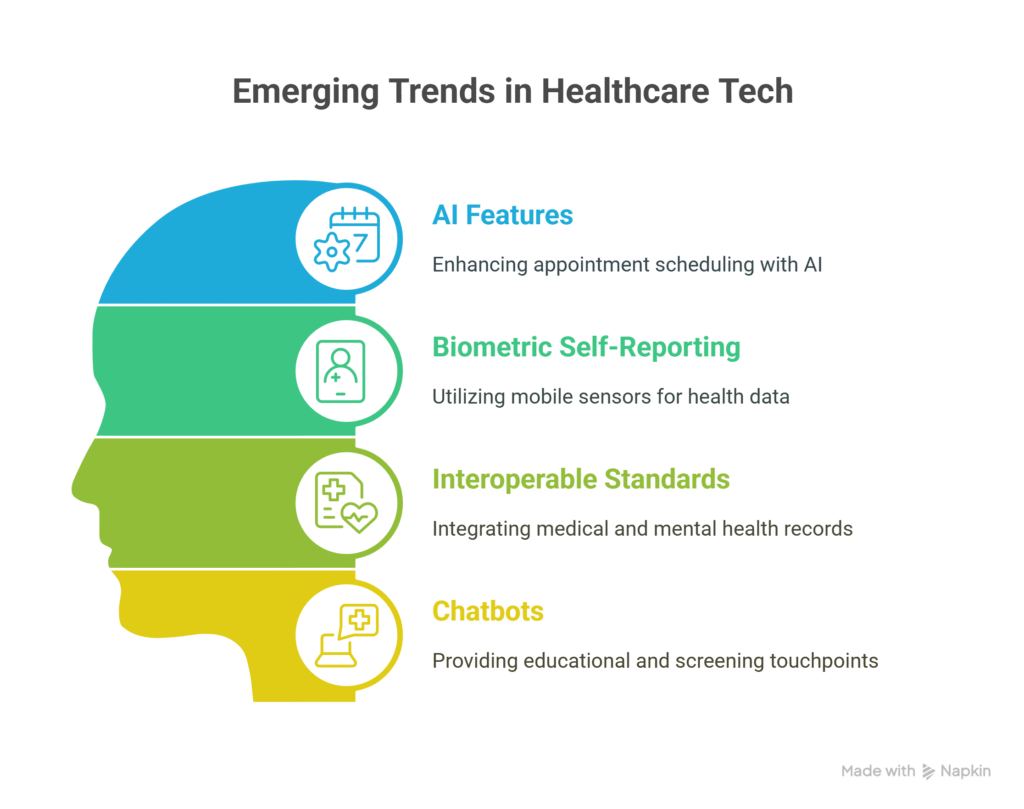
Planning for flexibility ensures your clinic can adopt advancements seamlessly.
13. Selecting the Right IT Vendor
When evaluating vendors, prioritize:
- Domain expertise in mental health IT
- HIPAA & data sovereignty compliance
- Local support and ongoing customer service
- Integration with existing platforms
- Clear pricing models and scalability
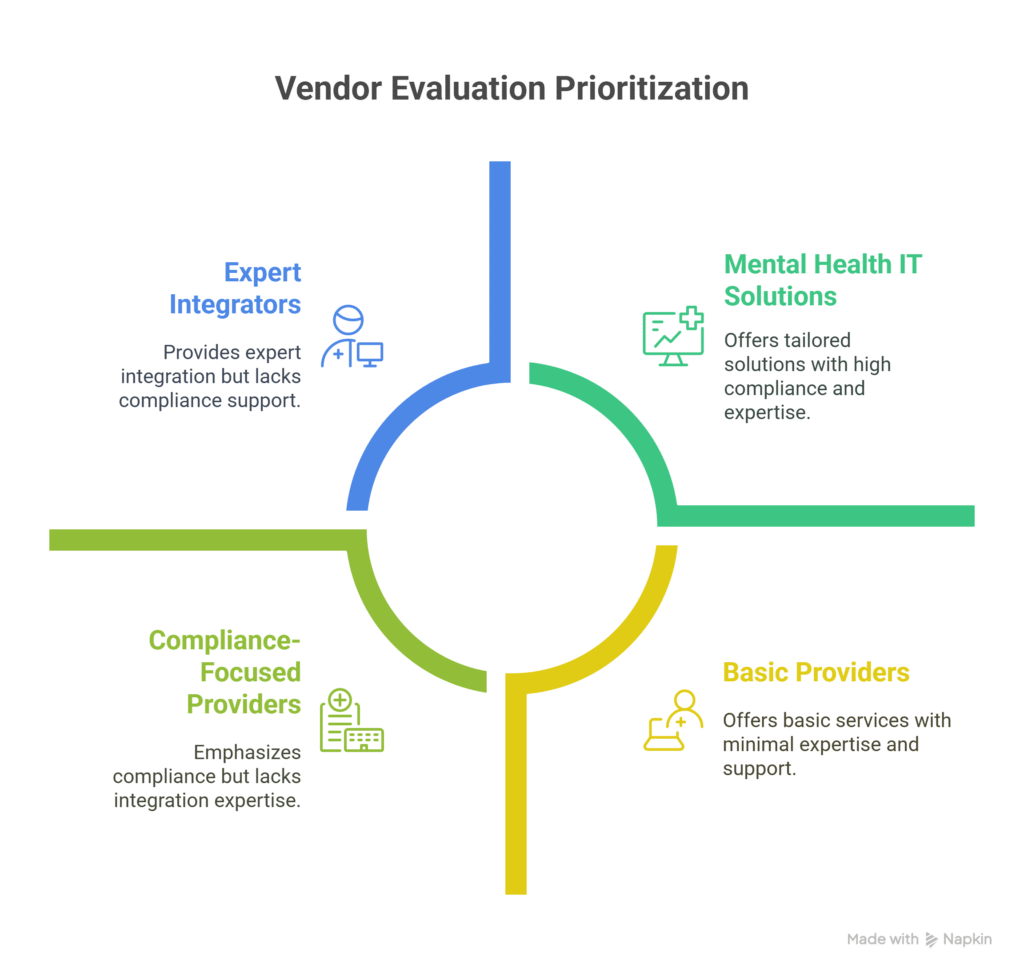
Looking for customized solutions? Mental Health IT Solutions offers tailored development and advisory services for clinics at any stage.
14. Successful Implementation Roadmap
A phased rollout ensures adoption and minimizes disruption:
- Evaluate Current Systems – Identify redundancy, risk, and integration gaps
- Define Requirements – Focus on users: clinicians, administrators, and clients
- Select Solutions – Prioritize interoperability and security first
- Pilot Launch – Roll out core functions to a few users
- Refine Based on Feedback
- Full Clinic Rollout with provider and staff training
- Ongoing Support & Optimization – Automated updates and system checks
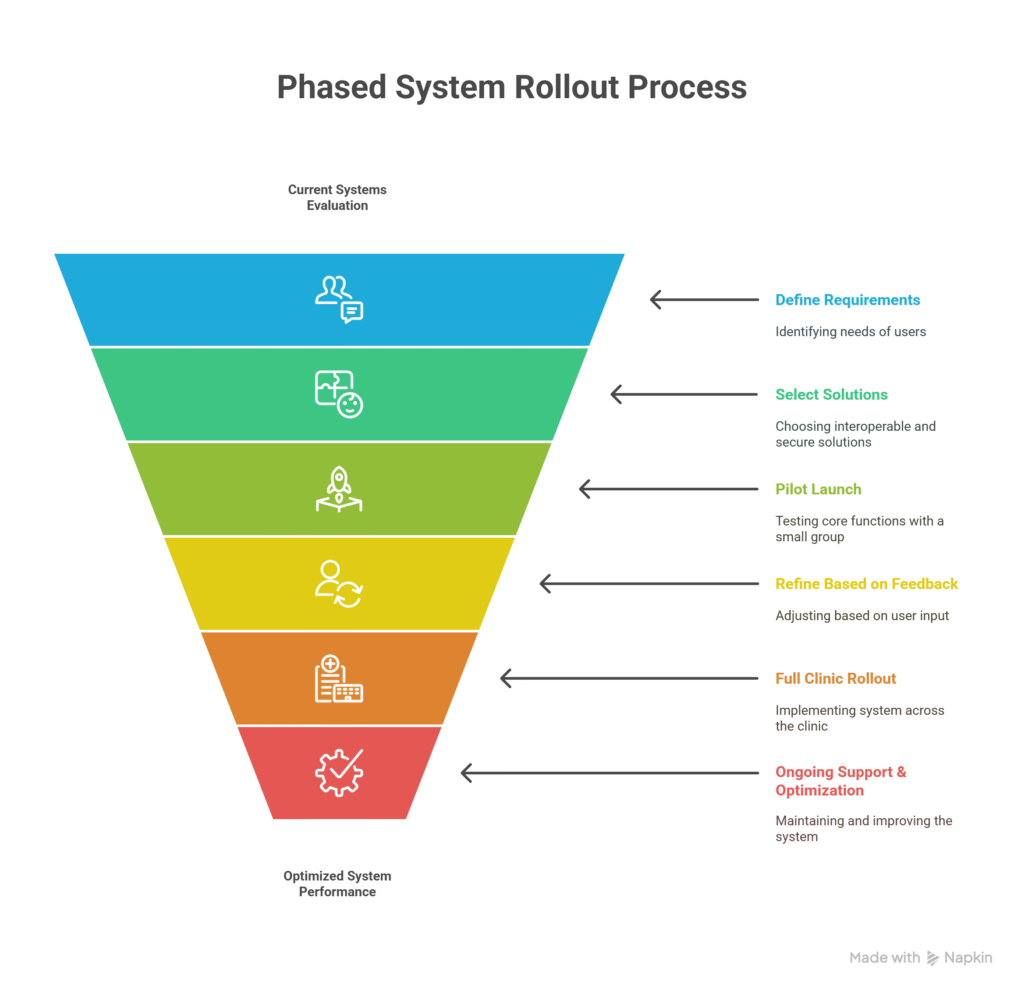
Conclusion: Modern IT Is Therapy’s Best Ally
IT solutions are no longer optional—they’re essential to deliver secure, scalable care in today’s world. From EHR and teletherapy to portals, security, and analytics, the right technology infrastructure empowers clinicians, supports clients, and fuels sustainable growth.
If you’re ready to elevate your clinic with thoughtfully integrated, client-centered technology, explore IT transformation packages with Mental Health IT Solutions—built specifically for mental health providers who care deeply.



